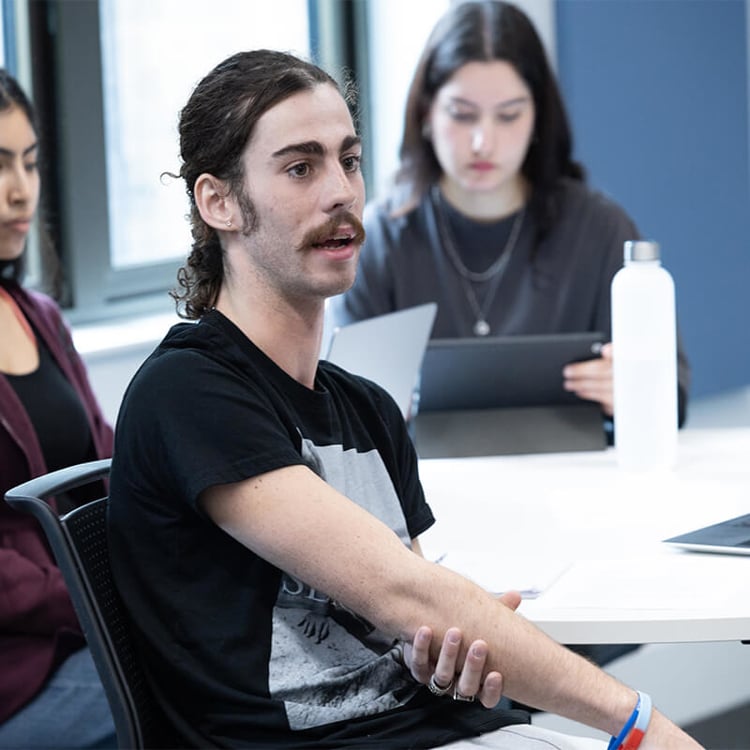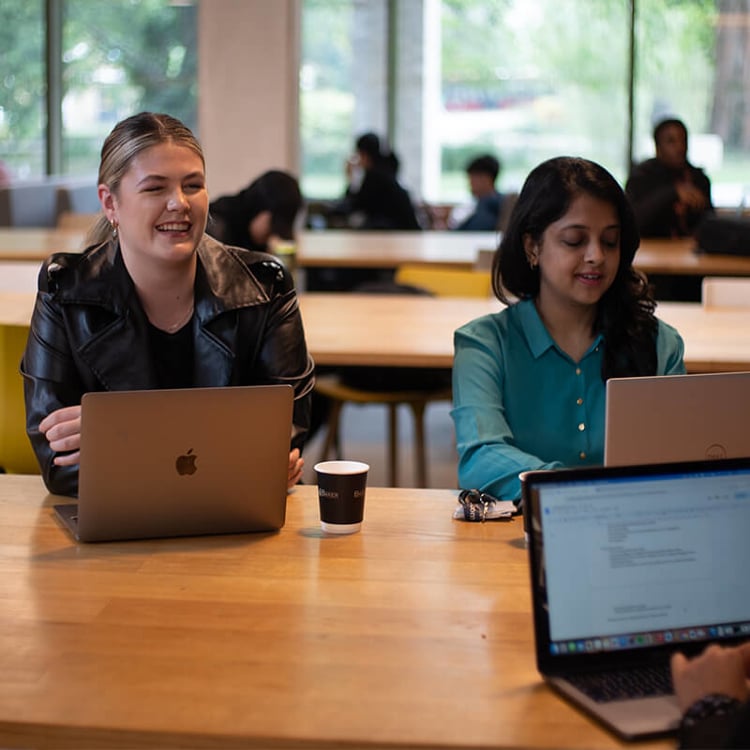/ Undergraduate /
Start date:
September 2025
You'll need:
112–128 UCAS points (or equivalent)
Foundation Year: 64–80 UCAS points (or equivalent)
UCAS code:
ML61
ML62 (If choosing Foundation Year)

On-Campus Open Day
Saturday 12 July 2025
Train with leading legal experts and academics to gain the knowledge and skills you need to fulfil a career in criminal justice by immersing yourself in the current trends and responses to crime today.
Did you know?
You'll have the opportunity to study an optional mini-SQE module to help you pass your SQE assessments.
You'll have the opportunity to experience legal work in action at Roehampton's Law Clinic.
Top 3 modern university in London
(Complete University Guide 2025)

Ranked in the top 15% in the world
Times Higher Education Young University Rankings 2024

#8 in England for undergraduate student satisfaction
National Student Survey 2024

Foundation Year
This course can also be studied with a foundation year (September entry only).
Modules
This course offers all students the option of a one-year paid work placement, to boost your employability even further. If you choose this route, you will take the placement following year two of your course, and then return to complete your degree.
Why take a placement?
A placement year is the perfect opportunity to gain valuable work experience, to build on the career skills we will teach you on this degree. The connections you make on the placement will improve your career prospects further, and equip you with the skills you need to secure graduate-level employment.
How we support you
The University's Placement and Work Experience Team are experts at helping you to secure a placement. They will work closely with you from the start, helping you research potential employers, discover placement opportunities, create and pitch your CV, and will coach you to perform well in interviews. We aren't able to guarantee a placement, but our sector-leading advisors will give you the best possible chance of securing one.
Find out more about how we'll support you
We understand that your plans might change once you start your programme. If you decide not to do a placement, you will have the option of completing the three year version of your programme.
Whatever your choice, you will have access to many opportunities for work experience through our Placement and Work Experience Team, and access to face-to-face and 24/7 online careers support.
This course offers a foundation year, which takes place at the beginning of your studies. Studying a foundation year will give you academic and practical experience, and a strong introduction to your subject, ensuring you succeed on your undergraduate degree.
30 credits
You will develop your core academic and integrated English language skills of speaking, listening, reading and writing. You will become familiar with key academic skills and concepts, such as referencing methods and awareness of academic integrity and tone. You will apply these skills and knowledge to both broad topics and also your chosen subject pathway.
Teaching and learning
You will be required to actively engage in on-campus learning for up to 10 hours a week.
You will be taught through a full range of teaching and learning methods, which include lectures, seminars, workshops, discussion groups, group directed tasks and presentations. This will enable you to learn from your peers and tutors in both structured and information settings.
You will be encouraged to think creatively about your approach to learning and discussions with your peers. You will also have access to recordings, resources, links and signposting through Moodle to enrich your learning.
Assessment
You will be assessed through group and individual presentations, comparative and reflective essays, multiple choice exams, coursework and reports, oral exams, portfolios, case studies and blogs.
30 credits
You will develop your research, numeracy and information technology skills. You will investigate the difference between primary and secondary research, conduct your own research project and demonstrate your findings through data analysis. You will also develop your awareness of equality, diversion and inclusion in the UK, through a real-world issue; discrimination in the workplace.
Teaching and learning
You will be required to actively engage in on-campus learning for up to 10 hours a week.
You will be taught through a full range of teaching and learning methods, which include lectures, seminars, workshops, discussion groups, group directed tasks and presentations. This will enable you to learn from your peers and tutors in both structured and information settings.
You will be encouraged to think creatively about your approach to learning and discussions with your peers. You will also have access to recordings, resources, links and signposting through Moodle to enrich your learning.
Assessment
You will be assessed through group and individual presentations, comparative and reflective essays, multiple choice exams, coursework and reports, oral exams, portfolios, case studies and blogs.
30 credits
This module supports a broad exploration of crime and law and its integration within society across various sources, which includes diverse cultural, social, and political representations. By analysing a wide range of topics, you are encouraged to critically engage with how disability, gender and race are represented and viewed in relation to crime and law.
This course integrates sustainability by looking at the sustainability of social interactions and your results and consequences in relation to crime and law. Social responsibility, legal injustice across the globe and inequality are all featured. Social Responsibility is embedded through topics such as social identity, prejudice and exclusion. Social Cognitive Theory and Rational Choice Theory helps you understand challenges and question accountability for individuals and communities.
This course fosters global engagement by examining the inequalities experienced in other cultures, particularly in relation to race, gender and exclusion. Global challenges are addressed at every step equipping you with the skills to navigate a globalised world in a variety of ways. By analysing data and text concerning diverse cultures and contexts, you will develop an understanding of how individuals and cultures operate amongst injustices in a globalised world, preparing you to engage thoughtfully with diverse audiences.
Teaching and learning
Through lectures, workshops, group work, and structured academic writing, you will have the opportunity to practice the core academic skills needed for your future studies. Critical thinking will be developed through tasks such as text analysis, group discussions, and the ability to create well-structured academic assignments, including essays and presentations.
The teaching delivery for each module consists of one, one-three-hour lecture and one, two-hour workshop per week. You will get a diverse learning experience through case studies and active learning workshops and microteaches.
You will also have an additional 30 minutes of online support each week, consisting of activities to develop your presentation skills and to provide you with opportunities to explore wider policy implementation in diverse/comparative transnational examples.
Assessment
This module will be assessed using a video presentation and summative essay.
30% - video presentation, working in groups, you will produce a video on a topic taught on the curriculum and explain its impact on UK society, using a real-world example.
70% - summative essay, you will identify an issue, either historical or contemporary, that has had an impact on UK society and connect it to at least one of the key topics covered in the course.
30 credits
This module provides you with some foundation for the study of the English Legal system. You will examine how legal rules are made and applied and become familiar with some of the special vocabulary of the law, as well as introducing you to the essential skills of the legal profession. For example, how to read legal cases and Statutes (Acts of Parliament).
You will also learn about some of the key institutions and processes that make up what we understand as the English Legal System.
The module will be taught at an introductory level using different teaching methods, and it will lay a foundation in understanding aspects of the legal process and the key features of English Common Law, Precedent, Statute Law, Separations of Power, an unwritten Constitution, trial by Jury and the rule of Law, to create a dynamic and resilient legal system.
You will develop an in-depth understanding of the different Court systems, Court processes, professional conduct rules and litigations in court. You will also gain background information on how the legal world functions.
Teaching and learning
The module follows a thoughtful combination of theory, applied learning and reflective practices. By emphasising real-world applications, ethical considerations and global awareness in the design, the module will prepare you to become responsible, skilled and adaptive legal professionals.
The teaching delivery for each module consists of one, one-three-hour lecture and one, two-hour seminar per week. Seminars will consist of individua and group activities.
You will also have an additional 30 minutes of online support each week, which will consist of individual tasks such as quizzes, posting on discussion forums, watching videos and taking notes and reading articles and chapters.
Assessment
This module will be assessed using an in-class open book, multiple choice questions and an individual legal report.
40% - open book, multiple choice questions.
60% - individual written report, choose from ‘discuss the extent to which the sources of law has provided certainty for lawyers that are providing legal advice or writing a report to demonstrate the legislative process, precedent and statutory interpretation rules.
These modules are those we currently offer and may be subject to change.

Skills
Think like a lawyer from day one.
The Roehampton Law School offers a practice-based approach to learning and a strong foundation for your future career.
Studying for our LLB (Hons) Law and Criminal Justice degree will give you a wide range of transferable skills, setting you up for success in any profession. You’ll explore:
- The essential law foundation subjects
- How to practice law
- A good understanding of current trends and responses to crime
You'll also draw on disciplines such as sociology, psychology and human rights and gain a dynamic understanding of legal concepts, values, principles and rules, as well as criminological theories and criminal justice practice.
You can put these skills into practice with an optional professional placement between Years 2 and 3 of your course. Fully supported by our Placement Office, this is a chance to gain paid work experience and make valuable industry connections.
Read former law student, Julia Cwierz's blog 'My Citizens Advice Placement', where she talks about her experience of doing pro bono work with Wandsworth Citizens Advice.
Learning
Get ahead with our ‘law in practice’ learning environment.
Designed by experienced academics and practitioners, with input from our internationally renowned Centre for Human Rights and Social Justice, this degree will encourage you to see the law in the context of everyday life right from the start.
You’ll spend most of your time in face-to-face classes, developing your understanding of legal and criminological issues and the core skills and competencies legal practitioners are expected to have.
Mandatory course modules include:
- Ethics and Skills: covering the structure and function of the English legal system
- Criminal Law, which focuses on key principles in crimes such as murder, manslaughter, non-fatal and theft-related offences
- Introduction to Criminal Justice, where you will analyse contemporary trends and policies in the criminal justice system
Beyond the Roehampton Law School, you’ll have opportunities to experience legal work in action through:
- The Roehampton Law Clinic
- Pro-bono placements (in partnership with Wandsworth Citizens’ Advice)
- Industry talks with guest speakers from across the sector
- An optional year-long paid work placement
- Visits to historic legal institutions, including Parliament, the Supreme Court, the Old Bailey, the four Inns of Court, the Law Society and the Royal Courts of Justice

Assessment
Evaluate your progress through real-world assessments.
During your time at Roehampton Law School, your projects, exercises, and assessments will reflect the contemporary working world of law, getting you ready for life after graduation.
Careers
Secure a sustainable legal career in a rapidly changing world.
With an LLB (Hons) Law and Criminal Justice degree from Roehampton, you’ll be ready to pursue a wide range of legal and criminal justics roles, including:
- Paralegal
- Crime Analyst
- Practicing Solictor or Barrister

You could also work in prison and probation services, the police, the Home Office, the Ministry of Justice and the court system. You will also be equipped to work in any career that demands critical reasoning skills.
The Roehampton careers team is available to support you from the start of your studies until after you graduate.
You’ll benefit from personalised sessions in CV and application writing, presentation practice, mock interviews, and commercial-awareness training. You’ll have the chance to meet future employers through our network of industry partners across London.
Our dedicated Law Careers Advisor will connect you with graduate recruiters and support you through every step of your career planning and job search.
Open days
Get a real taste of our campus, community and what it’s like to study at Roehampton
Applying
Full-time UK undergraduate students apply through UCAS.
Course subject to curriculum enhancement and revalidation.
Entry tariff
112–128 UCAS points (or equivalent)
Foundation Year: 64–80 UCAS points (or equivalent)
Looking to work out your UCAS points or find out about our entry requirements? Find out more.
When we consider applications to study with us, we form a complete view of your achievements to date, and future potential, and can offer flexibility in entry requirements. Find out more about our Contextual Offer scheme.
Specific entry requirements
GCSE requirement: English and Maths, Grade 4 (C) or higher.
General entry requirements
September 2025 entry tuition fees
UK (home) tuition fees
Undergraduate degree: £9,535
Foundation Year: £5,760
We offer a wide range of scholarships and bursaries. See our financial support pages for UK students.
We also provide other ways to support the cost of living, including free buses and on-campus car parking, hardship support and some of the most affordable student accommodation and catering in London. Find out more about how we can support you.
International undergraduate students apply through our direct application system.
Course subject to curriculum enhancement and revalidation.
Entry Tariff
112–128 UCAS points (or equivalent)
Foundation Year: 64–80 UCAS points (or equivalent)
Looking to work out your UCAS points or find out about our entry requirements? Find out more.
When we consider applications to study with us, we form a complete view of your achievements to date, and future potential, and can offer flexibility in entry requirements. Find out more about our Contextual Offer scheme.
Specific entry requirements
GCSE requirement: English and Maths, Grade 4 (C) or higher.
General entry requirements
September 2025 entry tuition fees
EU and international tuition fees
Undergraduate degree: £16,950
Foundation Year: £16,950
International Foundation Pathway: £16,950
We offer a wide range of scholarships and bursaries. See our financial support pages for international students.
We also provide other ways to support the cost of living, including free buses and on-campus car parking, hardship support and some of the most affordable student accommodation and catering in London. Find out more about how we can support you.





